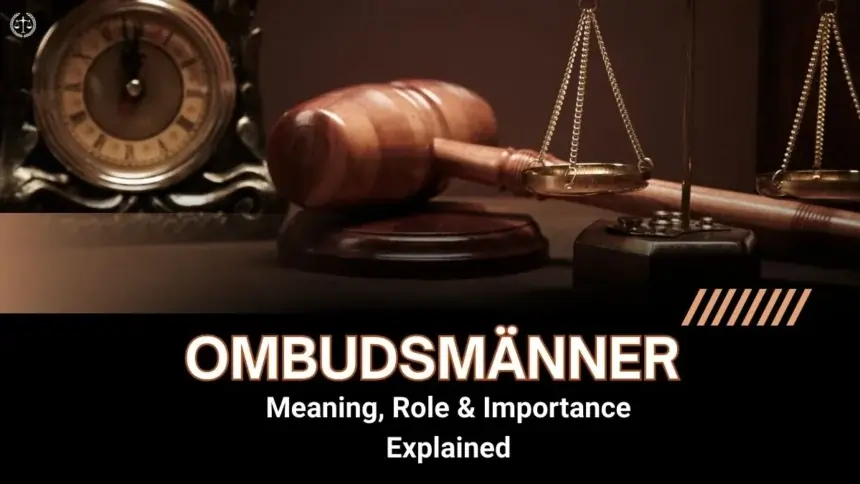Introduction
The word ombudsmänner comes from German and is the plural form of “ombudsmann.” It refers to officials who act as independent helpers or representatives for citizens. Their primary role is to investigate complaints, resolve issues, and ensure fairness within organisations. Whether in government, business, or education, ombudspersons serve as neutral points of contact when problems arise.
What Does Ombudsmänner Mean
The term has roots in the Scandinavian system of rule. An ombudsman was initially chosen to oversee government actions and ensure that citizens’ rights were protected. In German, the plural “ombudsmänner” means there are many representatives who do the same job. Today, the role is not limited to government. You also find ombudsmänner in workplaces, universities, healthcare systems, and international groups.
There’s plenty more to explore check out our other posts!
Core Responsibilities of Ombudsmänner
Ombudsmänner focus on fairness, responsibility, and solving problems. Their duties include:
-
Getting and looking into complaints from citizens or workers
-
Acting as fair go-betweens in conflicts
-
Giving ideas for solutions or actions to fix problems
-
Supporting openness and good behaviour
-
Making sure organisations follow rules and respect people’s rights
Their independence is important because people trust them more when they are not on anyone’s side.
Why Ombudsmänner Are Important
Arguments and problems happen often. In workplaces, employees may feel ignored. In government, people may find the system hard to deal with. In schools, students may think that they are mistreated. Ombudsmäner give a way for people to share their concerns safely. Their presence helps build trust in organisations, prevents problems from escalating, and often leads to faster results than going to court.
Types of Ombudsmänner
Different groups use ombudsmäner for special reasons. Common types include:
-
Government ombudsmänner: Handle public complaints about authorities or offices
-
Workplace ombudsmänner: Help employees with issues like unfair treatment or bullying
-
University ombudsmänner: Support students with school or rule-related problems
-
Healthcare ombudsmänner: Protect patients and handle service complaints
Each type has the same goal, but the focus depends on the place where they work.
How Ombudsmänner Work
The process usually follows a few steps:
-
A person sends a complaint to the ombuds office
-
The ombudsman studies the problem, gathers facts, and talks to all sides
-
A fair suggestion or solution is given
-
If needed, the ombudsman offers a fix or passes the case to a higher level
This method is easier and less scary than going to court.
Benefits of Approaching Ombudsmänner
Working with an ombudsperson brings several good things:
-
Fair and private help
-
Cheaper than going to court
-
Quicker solutions
-
Focus on what’s fair, not on blaming
-
Support for peaceful conversation
For people, it’s a way to speak up without fear. For organisations, it helps build trust and maintain honesty.
Challenges Ombudsmänner Face
Even though their job is essential, ombudsmäner have some problems:
-
Limited power: Their advice is not always followed
-
Lack of resources: Small teams handle too many issues
-
Staying fair: They must not take sides but still earn trust
-
Low public awareness: Many people don’t know they can go to ombudsmänner
Still, their role is growing worldwide.
Global Perspective
The idea of ombudsmäner has spread beyond Europe. Many countries have similar roles with different names. Big international groups, such as the United Nations and the European Union, also have ombuds offices: this global example demonstrates the effectiveness of fostering honesty and responsibility in various areas.
How to Contact Ombudsmänner
If you need help from an ombudsperson, here’s how to do it:
-
Check your company or school’s website for an ombuds office
-
Contact them by email, phone, or visit in person
-
Clearly explain your issue
-
Share any valid documents or messages
-
Follow privacy rules during the process
The goal is not to win, but to find a fair and helpful result.
Future of Ombudsmänner
As people ask for more openness and fairness, ombudsmäner will likely become more critical. With the rise of online work and digital services, new problems, such as cybersecurity and online rights, are emerging. Ombudspersons can help guide these changes by ensuring fairness stays at the centre.
Want to learn more? Our full collection of posts is ready for you!
Conclusion
The term ombudsmänner means more than just a title. These professionals are protectors of fairness, helpers in times of trouble, and trusted individuals for those who feel overlooked. Whether in government, work, school, or health care, they bring balance and build trust. If you are mistreated or have an unresolved issue, reaching out to an ombudsperson is a good first step toward a fair and peaceful solution.
FAQs About Ombudsmänner
Q1. What is the main job of an ombudsman?
An ombudsman listens to complaints, investigates problems, and helps find fair solutions.
Q2. Can anyone go to an ombudsperson?
Yes, if your organisation or country has a designated contact, you can reach out to them for assistance with a problem.
Q3. Is the ombudsman’s decision final?
Not always. They give advice or suggestions, but it’s up to the organisation to follow them.
Q4. Are ombudsmänner only in government?
No. They also work in various settings, including workplaces, schools, hospitals, and international organisations.
Q5. Is it safe to report a complaint to an ombudsperson?
Yes. The process is private, and they are neutral, so you won’t face punishment for speaking up.
Q6. Do I need a lawyer to contact an ombudsperson?
No. You don’t need legal help. The process is simple and open to everyone.




